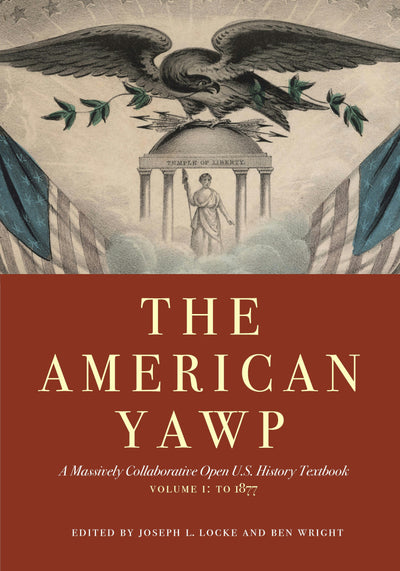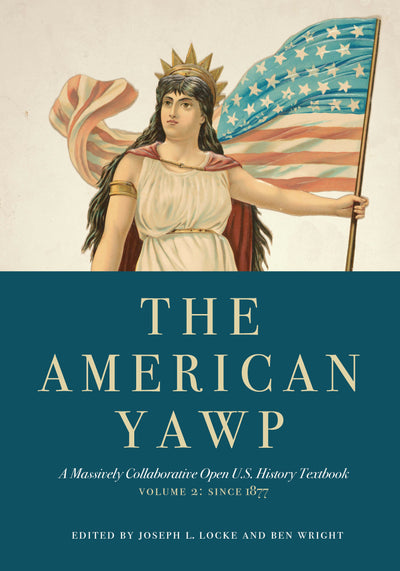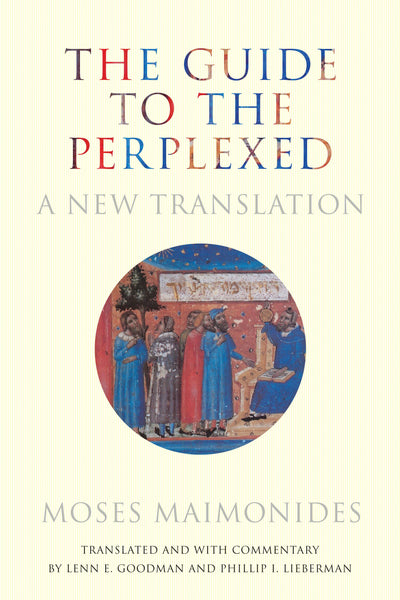You may also like
The American Yawp
Regular price $25.00 Save $-25.00"I too am not a bit tamed—I too am untranslatable / I sound my barbaric yawp over the roofs of the world."—Walt Whitman, "Song of Myself," Leaves of Grass
The American Yawp is a free, online, collaboratively built American history textbook. Over 300 historians joined together to create the book they wanted for their own students—an accessible, synthetic narrative that reflects the best of recent historical scholarship and provides a jumping-off point for discussions in the U.S. history classroom and beyond.
Long before Whitman and long after, Americans have sung something collectively amid the deafening roar of their many individual voices. The Yawp highlights the dynamism and conflict inherent in the history of the United States, while also looking for the common threads that help us make sense of the past. Without losing sight of politics and power, The American Yawp incorporates transnational perspectives, integrates diverse voices, recovers narratives of resistance, and explores the complex process of cultural creation. It looks for America in crowded slave cabins, bustling markets, congested tenements, and marbled halls. It navigates between maternity wards, prisons, streets, bars, and boardrooms.
The fully peer-reviewed edition of The American Yawp will be available in two print volumes designed for the U.S. history survey. Volume I begins with the indigenous people who called the Americas home before chronicling the collision of Native Americans, Europeans, and Africans.The American Yawp traces the development of colonial society in the context of the larger Atlantic World and investigates the origins and ruptures of slavery, the American Revolution, and the new nation's development and rebirth through the Civil War and Reconstruction.
Rather than asserting a fixed narrative of American progress, The American Yawp gives students a starting point for asking their own questions about how the past informs the problems and opportunities that we confront today.

The American Yawp
Regular price $25.00 Save $-25.00"I too am not a bit tamed—I too am untranslatable / I sound my barbaric yawp over the roofs of the world."—Walt Whitman, "Song of Myself," Leaves of Grass
The American Yawp is a free, online, collaboratively built American history textbook. Over 300 historians joined together to create the book they wanted for their own students—an accessible, synthetic narrative that reflects the best of recent historical scholarship and provides a jumping-off point for discussions in the U.S. history classroom and beyond.
Long before Whitman and long after, Americans have sung something collectively amid the deafening roar of their many individual voices. The Yawp highlights the dynamism and conflict inherent in the history of the United States, while also looking for the common threads that help us make sense of the past. Without losing sight of politics and power, The American Yawp incorporates transnational perspectives, integrates diverse voices, recovers narratives of resistance, and explores the complex process of cultural creation. It looks for America in crowded slave cabins, bustling markets, congested tenements, and marbled halls. It navigates between maternity wards, prisons, streets, bars, and boardrooms.
The fully peer-reviewed edition of The American Yawp will be available in two print volumes designed for the U.S. history survey. Volume II opens in the Gilded Age, before moving through the twentieth century as the country reckoned with economic crises, world wars, and social, cultural, and political upheaval at home. Bringing the narrative up to the present,The American Yawp enables students to ask their own questions about how the past informs the problems and opportunities we confront today.

The Guide to the Perplexed
Regular price $50.00 Save $-50.00A landmark new translation of the most significant text in medieval Jewish thought.
Written in Arabic and completed around 1190, the Guide to the Perplexed is among the most powerful and influential living texts in Jewish philosophy, a masterwork navigating the straits between religion and science, logic and revelation. The author, Rabbi Moses ben Maimon, commonly known as Maimonides or as Rambam, was a Sephardi Jewish philosopher, jurist, and physician. He wrote his Guide in the form of a letter to a disciple. But the perplexity it aimed to cure might strike anyone who sought to square logic, mathematics, and the sciences with biblical and rabbinic traditions. In this new translation by philosopher Lenn E. Goodman and historian Phillip I. Lieberman, Maimonides' warm, conversational voice and clear explanatory language come through as never before in English.
Maimonides knew well the challenges facing serious inquirers at the confluence of the two great streams of thought and learning that Arabic writers labeled 'aql and naql, reason and tradition. The aim of the Guide, he wrote, is to probe the mysteries of physics and metaphysics. But mysteries, to Maimonides, were not conundrums to be celebrated for their obscurity. They were problems to be solved.
Maimonides' methods and insights resonate throughout the work of later Jewish thinkers, rationalists, and mystics, and in the work of philosophers like Thomas Aquinas, Spinoza, Leibniz, and Newton. The Guide continues to inspire inquiry, discovery, and vigorous debate among philosophers, theologians, and lay readers today. Goodman and Lieberman's extensive and detailed commentary provides readers with historical context and philosophical enlightenment, giving generous access to the nuances, complexities, and profundities of what is widely agreed to be the most significant textual monument of medieval Jewish thought, a work that still offers a key to those who hope to harmonize religious commitments and scientific understanding.

Hamas Contained
Regular price $22.00 Save $-22.00Hamas has ruled Gaza and the lives of the two million Palestinians who live there since 2006. Hamas Contained, first published in 2018, offers a history of the group, drawing on interviews with organization leaders and their publications. Tareq Baconi maps Hamas's thirty-year transition from fringe military resistance towards governance, culminating in Israeli efforts to contain the movement to the Gaza Strip. Baconi argues that under Israel's approach of managing rather than resolving the conflict, Hamas's demand for Palestinian sovereignty has effectively been marginalized in favor of military action against Hamas, and by implication, all Palestinians in the Gaza Strip. This dynamic—a violent equilibrium between Hamas and Israel and the movement's containment in the Gaza Strip—lasted for sixteen years, until it was decidedly shattered by Hamas's offensive on October 7, 2023.
Now with new material that provides an analytical framework and reflection on Hamas's offensive of October 7, 2023, and Israel's ensuing war on Gaza, Hamas Contained is an even more essential guide to understanding Hamas and the brutal violence of Israel's war on Palestinians.

Anteaesthetics
Regular price $30.00 Save $-30.00In Anteaesthetics, Rizvana Bradley begins from the proposition that blackness cannot be represented in modernity's aesthetic regime, but is nevertheless foundational to every representation. Troubling the idea that the aesthetic is sheltered from the antiblack terror that lies just beyond its sanctuary, Bradley insists that blackness cannot make a home within the aesthetic, yet is held as its threshold and aporia. The book problematizes the phenomenological and ontological conceits that underwrite the visual, sensual, and abstract logics of modernity.
Moving across multiple histories and geographies, artistic mediums and forms, from nineteenth-century painting and early cinema, to the contemporary text-based works, video installations, and digital art of Glenn Ligon, Mickalene Thomas, and Sondra Perry, Bradley inaugurates a new method for interpretation—an ante-formalism which demonstrates how black art engages in the recursive deconstruction of the aesthetic forms that remain foundational to modernity. Foregrounding the negativity of black art, Bradley shows how each of these artists disclose the racialized contours of the body, form, and medium, even interrogating the form that is the world itself. Drawing from black critical theory, Continental philosophy, film and media studies, art history, and black feminist thought, Bradley explores artistic practices that inhabit the negative underside of form. Ultimately, Anteaesthetics asks us to think philosophically with black art, and with the philosophical invention black art necessarily undertakes.

Belonging without Othering
Regular price $30.00 Save $-30.00The root of all inequality is the process of othering – and its solution is the practice of belonging
We all yearn for connection and community, but we live in a time when calls for further division along the well-wrought lines of religion, race, ethnicity, caste, and sexuality are pervasive. This ubiquitous yet elusive problem feeds on fears – created, inherited – of the "other." While the much-touted diversity, equity, and inclusion initiatives are undeniably failing, and activists narrowly focus on specific and sometimes conflicting communities, Belonging without Othering prescribes a new approach that encourages us to turn toward one another in unprecedented and radical ways.
The pressures that separate us have a common root: our tendency to cast people and groups in irreconcilable terms – or the process of "othering." This book gives vital language to this universal problem, unveiling its machinery at work across time and around the world. To subvert it, john a. powell and Stephen Menendian make a powerful and sweeping case for adopting a paradigm of belonging that does not require the creation of an "other." This new paradigm hinges on transitioning from narrow to expansive identities – even if that means challenging seemingly benevolent forms of community-building based on othering.
As the threat of authoritarianism grows across the globe, this book makes the case that belonging without othering is the necessary, but not the inevitable, next step in our long journey toward creating truly equitable and thriving societies. The authors argue that we must build institutions, cultivate practices, and orient ourselves toward a shared future, not only to heal ourselves, but perhaps to save our planet as well. Brimming with clear guidance, sparkling insights, and specific examples and practices, Belonging without Othering is a future-oriented exploration that ushers us in a more hopeful direction.







